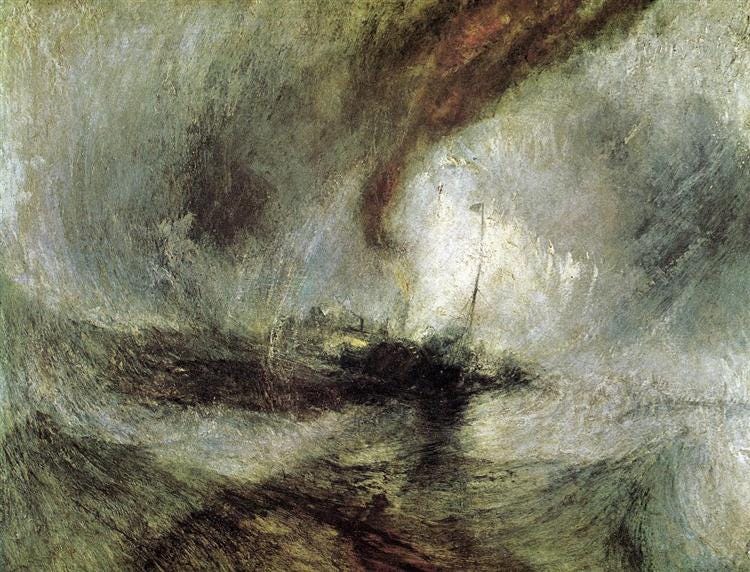Sublimed
Overcome with awe, wonder, and terror all at the same time? As my students used to say, you've been sublimed.
Despite almost burning Walden woods to the ground in 1844 and spending a night in jail to protest the use of his taxes to fund the Mexican-American War, Henry David Thoreau (born David Henry) was a pretty straight-laced fellow by most standards. A pencil maker by trade, he did some survey work on the side, and even in the midst of his wilder moments contained himself with the use of phrases such as “perchance” and “saunter.” But in all of his voluminous writings, there is one moment when David Henry lost his cool.
It was 1846. Lost in the fog after a failed attempt to summit Mount Katahdin, Maine’s highest peak, Thoreau became disoriented, confused, and perhaps even a little scared, his self-control peeling away like wisps of fog resulting in one of the most raw and honest passages in all of his works:
“Nature was here something savage and awful, though beautiful … This was that Earth of which we have heard, made out of Chaos and Old Night … Man was not to be associated with it. It was Matter, vast, terrific … There was clearly felt the presence of a force not bound to be kind to man. It was a place for heathenism and superstitious rites,—to be inhabited by men nearer of kin to the rocks and to wild animals than we … I stand in awe of my body, this matter to which I am bound has become so strange to me. I fear not spirits, ghosts, of which I am one,—that my body might,—but I fear bodies, I tremble to meet them. What is this Titan that has possession of me? Talk of mysteries! Think of our life in nature,—daily to be shown matter, to come in contact with it,—rocks, trees, wind on our cheeks! the solid earth! the actual world! the common sense! Contact! Contact! Who are we? where are we?”
Thoreau had been sublimed.
I know the feeling. One a.m. alone on the blue-black back of Lake Superior, miles out in the islands which surround me now like a pod of sleeping whales. I am lying flat on my back aboard the Little Dipper letting her drift in the dark as I stare straight up into my own “Chaos and Old Night" in the form of a kaleidoscope of light and stars and energy that is at the same time soul-shakingly beautiful and utterly terrifying. Northern Lights: the very definition of “sublime.”
The concept of the sublime, as explored in a 1757 text by Edmund Burke entitled Philosophical Enquiry into the Origin of Our Ideas of the Sublime and the Beautiful, was a kind of intellectual knee-jerk reaction to the 17th century mindset known as the Enlightenment. The Enlightenists believed that the human place in nature could be understood only through the collective application of reason and rational thought.
The Romantics however, turned such thinking on its head exalting in individualism over conformity, imagination over reason, and passion over rational thought. Nature was, to the Romantic, a place for introspection and insight and emotion. Those emotions, Burke claimed, included the kind of fear awash in chaos often felt as we stand (or in my case lie flat on your back) in the presence of forces unfathomable and beautiful. That beauty within chaos found its way into literature and art, most notably when painter J.M.W. Turner lashed himself to the smokestack of a steamboat in a snowstorm to better experience, and then paint, nature’s awe and power.
(J.M.W. Turner, Snow Storm - Steamboat off a Harbour's Mouth, 1842)
I don’t have to lash myself to the Little Dipper. Instead, I just lie on my back on the deck, hands clasped behind my head, feeling the lake swirl beneath me while the aurora dances above. It is beautiful, and disorienting, and yes, a little frightening — untold fathoms of dark water beneath me, fingertips of reaching, beckoning light 600 miles above. I think of Thoreau with his syntax racing faster than his heart in that Katahdin fog. I think of Edmund Burke who made it culturally acceptable to find beauty not just in fields of wildflowers and spotted fawns but in the depths of our fears and on that fine edge between wonder and terror.
But mostly, I think of my students who, after our study of the sublime in literature and art, used to watch for that certain look in someone’s eyes as they witnessed a sunset blaze red or a storm darken the sky, and say, “You’ve been sublimed!”
There is beauty in a chaos and a power beyond our control and even beyond our ability to completely understand, if only we let ourselves feel it.
I smile to myself in the dark, feeling happy, scared, awed, and, yes, sublimed.
— Jeff Rennicke (all photographs by the author unless otherwise noted).
When was the last time you were “sublimed”? Use the link below to send me a message and tell me about it.









Wonderful moment of the sublime. Thank you for sharing it.
In the lab there is a process of sublimation. We freeze a sample and then gradually the liquid sublimes/evaporates. There is a mist. 🤔